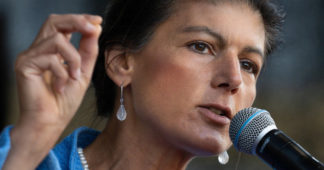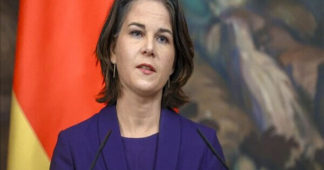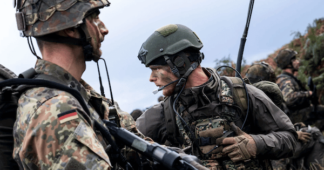Germany’s political elite has subordinated itself to US geopolitical strategy. Why and how explains Wolfgang Streeck in this interview
Wolfgang Streeck is the Emeritus Director of the Max Planck Institute for the Study of Societies in Cologne, Germany
Originally published in Croation here
Feb 20, 2023
1. In your articles you write about the “post-Zeitenwende Germany”, referring to the content of Chancellor Scholz’s speech in the Bundestag on the eve of the war in Ukraine. Can you explain what this “turning point” means for German foreign and defence policies in the years to come and also for Europe, and how is this linked to the increasing Americanisation of German politics, ideology and culture? (A telling quote of yours says: “Seen this way, the fact that the special €100 billion defence budget announced by the German government three days into the war will have its first effects on the ground only in five years’ time does not mean that it is wasted; it only means that it has nothing to do with the Ukrainian war as such”.)
Political slogans are manufactured so as to be open to different interpretations. What is clear is that Scholz’s Zeitenwende entails a promise, above all to the United States, that Germany will from now on, unlike in the past, act in line with a view of the world as divided between “the West“ and an evil empire, or better: several evil empires, from Russia to China to Iran, the list waiting to be expanded. (There are also various in-between empires, like India or Brazil, which we will have to get to take our side.) Between us, the virtuous empire under American leadership organised in NATO and the various evil empires, peace is possible only temporarily and intermittently, and only as long as we enjoy military superiority. In principle we and they are at each other‘s throats. Real peace will require a regime change making an evil empire part of our virtuous one, as a result of its conversion to “our values“. For the virtuous empire it is legitimate to use all its political, economic, and military means to bring such conversion about.
After the Zeitenwende wars will always be around the corner and we must be prepared for them. What should help is that a virtuous empire’s “value-driven” or “feminist foreign policy” (Baerbock) fights only just wars, as wars against evil cannot be unjust. The underlying world view here is not social-Darwinist, history being a battle for the “survival of the fittest“, but Manichaean, in which history is a relentless struggle between good and bad, in which the forces of virtue must do their utmost to prevail over those of evil. Before they have won, there can be no real peace, only cease-fires for tactical reasons. For real peace we, the forces of virtue, must prepare for war, not just to deter the enemy from attacking us but to make him mend his ways and become one of us.
There is a strong and a weak version of Zeitenwende rhetoric. The strong version implies that the world was always like this: ontologically Manichaean. Those who in the past had a different view were either feeble-minded fools, cowards who all-too-willingly let themselves be deceived by enemy propaganda, or traitors, bribed by the forces of evil one way or other, putting their personal interests above those of the nation or the world. This essentially coincides with the world view of the Clinton wing of the Democratic Party in the United States. The weak version, the one Scholz obviously prefers, is that the world has recently changed: while in the past it allowed for peaceful coexistence between regimes and countries with different interests or “identities” – so that life in peace could be preferred over victory in war – now the enemy has become so evil that there is no moral alternative to defeating him, cost it what it may. When exactly that change occurred need not necessarily be specified; it may have been when a man named Putin for some bizarre reason underwent an unprovoked transformation from corrupt leader of a corrupt state into a genocidal maniac – a pathological turn that requires heroic surgery by the friends of humanity, and now.
2. What is the core of the German promise to the United States?
At the bottom line, it is that the very weak attempts of the Merkel government, especially after 2015, to seek a little more autonomy in its foreign policy, are over. Rather than passive resistance, as was the case with the accession of Ukraine to NATO and the EU, or to energy policy, especially Nord Stream 2, or the two percent military spending target, not to mention insubordination as in Iraq, Syria, and Libya, where Germany refused to send troops, Germany would from now on act as it is told to. In this sense, the Zeitenwende speech was a response to intensified pressure, already before the war, from the US and the Christian-Democratic opposition, but also from the Greens in government, for Germany to fall in line with the foreign policy of the United States, in particular the Biden administration.
At the same time, Bob Dylan is right and times continue to be a’changing. How long the German government can remain as subservient to the United States as it has now promised to be is an open question, considering the risks that come with Germany’s territorial closeness to the Ukrainian battlefield – a risk not shared by the US. There is also pressure from France for Germany to become more European and less transatlantic in outlook, and this may with time have an impact. Furthermore, it is likely that the US at some point will try to “Europeanise” the war and bow out, as they tried to “Vietnamise” the Vietnam war in the 1970s, hoping that post-Zeitenwende Germany will take the burden of sponsoring their proxy war from them. Whether the Germans will be better able and more willing to do so after the 100-billion-euro injection announced by Scholz one may doubt.
3. You mention warmongering opinion pieces published in mainstream newspapers such as FAZ and how it is no longer allowed to question official narratives about the war in Ukraine. Also, the German parliament recently passed the resolution by which Holodomor is proclaimed genocide even though there is no consensus about this event among historians, and an amendment to the Criminal Code which makes it a crime to deny not only Holocaust, but also “war crimes” in general. Can you describe this censorship on the part of government, but also, as you call it, “self-imposed censorship in civil society” and the possible consequences of these developments?
Right now, official Germany, and I include the so-called quality media, behaves like a country at war. The government is readying the tools to unleash the police and, in particular, the security services on anyone who doubts the wisdom of pledging full-scale support to the ultra-nationalist government of Ukraine and the Biden administration. Those trying to explain the behavior of the Putin regime in terms other than a supposed clinical madness or genocidal obsession or both on the part of its chief are easily branded as Putinversteher, which when they are young aspiring journalists or political scientists may be the end of their career. But as you say, this is not just the government. There is a strong desire among normal people not to be caught calling for anything other than a Ukrainian “victory”, as defined by the Ukrainian government, whatever it may take. For many Germans these days, victory means nothing less than Putin and his henchmen and henchwomen having to stand trial at the international criminal court in The Hague. There is no mention at all of the risks of, for example, the fallout of nuclear war hitting countries outside of the battlefield, including Germany.
Nor is there a political debate about what the European or Eurasian world would be like after the war, although everything points to a scenario under which Crimea won’t be returned to Ukraine, and neither will be the oblasts that were captured by Russia after Crimea. If there will be something like a peace agreement any time soon, which I doubt, there would be some sort of international co-government there, plus some kind of neutrality for Ukraine as a whole. More likely, however, the United States will prefer a drawn-out phony war, with occasional battles at roughly the present front line, both parties basically dug into their present position. This would provide for a lasting weakening of Russia and a stable restoration of American hegemony over Western Europe, both of which are in the interest of the United States as they prepare for the real war, economic and military: the war with China. For this, a year-long dragged-out freezing of the conflict lines in Ukraine is all that is needed.
As for Europe, the United States may not object to Germany, Poland, and others continuing to help the Ukrainian government pursue its dream of a final victory over Russia, at their own cost and risk. With Germany and the EU having turned their political judgment over to Zelenskiy and Biden, and serious discussion of the aims of the war – the terms of a settlement – being de facto precluded, this is quite a frightening prospect.
4. To the surprise of many superficial observers, particularly outside of Germany, the Green Party has turned out to be the most hawkish, belligerent and in that sense dangerous party within the ruling coalition. Can you explain how this came to be? And how, in your opinion, do they manage to reconcile their proclaimed political imperative of saving the planet on one hand, and supporting some of the ecologically most destructive elements in the global order (military-industrial complex) on the other?
How they deal with their contradictions I leave to them. The American military alone, one hears, is responsible for five percent of global CO emissions, more than what is emitted by two thirds of the 200 countries of this world together. There are also no complaints it seems about the carbon footprint of the 35 F-35 fighter bombers the German Greens insist on being purchased from the United States in celebration of Zeitenwende – not to mention the environmental damage caused by nuclear war should it take place, even if on a tactical level.
As for Green belligerence, it has been waiting in the wings for some time; remember Joschka Fischer and the bombing of Belgrade. Moral universalism always brings with it a temptation to rectify the world by force, especially for a generation that has no idea of what a war is: an increasingly senseless slaughter as it drags on, feeding on itself through the fear and hatred and the desire for retribution that it engenders on all sides. The longer a war, the more difficult the return to peace given the sacrifices made and the brutalities suffered. For this reason alone, wars tend to last longer than planned, far beyond the point when their costs exceed the gains for which they were conducted. Many Greens today seem to believe in the possibility of a just war, performed like a clinical operation, justified by a morally superior purpose. This is how idealistic Americans have again and again been talked into believing that the American military is there to defend and spread freedom and democracy. Today American messianism seems to have migrated to Europe, for example when the current German foreign minister names Hillary Clinton as a role model and seems to think that the cause of women in Iran is best served by refusing to renew the agreement on nuclear non-proliferation between Iran and Western countries, canceled by Trump. Of course, in the case of Ukraine the new Green heroism is cheap as “we” are letting the Ukrainians fight for us, insisting that no German troops will ever be sent to Ukraine. (In any case, like in all wars, it wouldn’t be the children of the prosperous middle class, the Green political mainstay, who would have to get themselves killed or mutilated on the battlefield; remember that unlike Ukraine we have abolished compulsory military service for men – for women it was never considered nor asked for in the name of feminist progress.). And obviously, as the Greens are no longer willing forever to base their future on coalitions with social democracy, they need to find joint positions with the centre-right, which is not just pro-American but also, like the German FDP, passionately in bed with the arms industry.
5. In many of your articles you mention the nuclear threat as something realistic but also notice that the German public refuses to consider the damage that the nuclear escalation in Ukraine would cause and what it would mean for Europe. How do you explain this collective burying of heads in the sand?
In a war you are not supposed to say certain things or else you are accused of siding with the enemy. In some way, addressing the risk of nuclear war is taboo, with a good deal of superstition behind it: speak of the devil and he doth appear. The idea is you prevent nuclear war by not talking about it. The difference to the German conversation on nuclear power plants is dramatic: here even the slightest, most improbable risk is considered unacceptable, perhaps rightly so, perhaps not, but the result is that in a few weeks from now, the last nuclear power plant in Germany will be switched off, no matter the huge energy shortage due to the Western sanctions against Russia. It should be obvious that if a regime like Putin’s found itself on the brink, the risk of nuclear war would be high, and with it the risk of Europe-wide radio-active contamination with severe consequences for human life. This alone would speak urgently for a cease-fire, as soon as possible. But since the Ukrainian government and, up to now, the United States oppose a cease-fire, there seems to be no attempt by the German government to explore this possibility as diplomacy has become almost synonymous with treason these days. So something that is a real present danger cannot be mentioned in democratic public debate. There is of course also the fear that if the risk of nuclear war was talked about in earnest – the taboo lifted – the public would begin to wonder about the aims of the war and whether an end to it could not be achieved short of fulfilling all the wishes of the Ukrainian government. Ultimately it would be likely to turn out that the number of people in Germany and Western Europe who are willing to die for Sebastopol is limited.
6. Die Linke and the AfD have in many instances in the recent months been on the “same side”, while pacifism, as you write, is increasingly being viewed as “either treason or a mental illness”. Having this in mind, do you see any prospects for influential left wing politics in the near future?
Die Linke has for some time been falling apart. Their election results are catastrophic and were so even before the war. Internally the party is deeply divided. A large segment of its membership accepts the commandment of the political centre that you must never say something that the AfD also says; as a result, they are essentially limited to saying what the parties of the centre say. Apart from demanding an increase in social benefits across the board the party has no real programme, at least none that it would agree upon or could actively promote. Concerning the war, many in the party, like the Greens, seem to believe that if you morally disapprove of a regime you cannot agree with it on a peace-preserving international order. Generally, if the Left – any Left – depends on its ability to offer ideas for alternative politics and indeed way of life, Die Linke is already dead; it has nothing to say that could catch public attention or excite public controversy. Outside of a shrinking inner circle its voice is basically not heard, apart from the voice of Sara Wagenknecht who has, however, no influence at all anymore on the official party line.
We remind our readers that publication of articles on our site does not mean that we agree with what is written. Our policy is to publish anything which we consider of interest, so as to assist our readers in forming their opinions. Sometimes we even publish articles with which we totally disagree, since we believe it is important for our readers to be informed on as wide a spectrum of views as possible.











